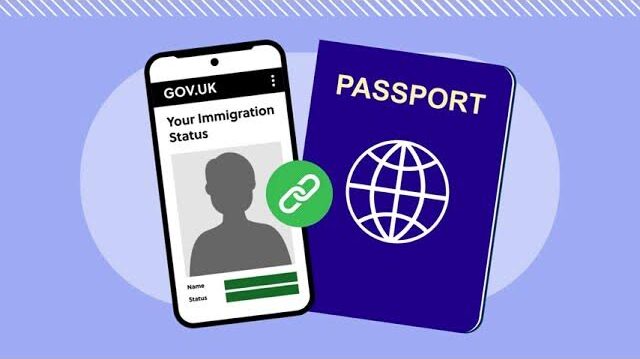UK eVisa rollout: Your questions answered
The government is urging all those across the UK who use a physical immigration document to take immediate action to transition to an eVisa, as part of plans to digitise the UK border and immigration system.

The UK’s immigration system is going ‘digital by default’ by 2025. This means the government is replacing physical immigration documents with a digital proof of immigration status called an eVisa. The initiative will increase the security and efficiency of the immigration system and enable eVisa holders to prove their rights instantly, accurately and securely.
The Home Office has published guidance for visa holders and employers on the transition to eVisas and what action is required. It is free and straightforward to switch to an eVisa and affected individuals must take action before 31 December 2024.
Below, we answer some frequently asked questions from visa holders and employers about the eVisa rollout process.
What is an eVisa?
An eVisa is an online record of your immigration status and the conditions of your permission to enter or stay in the UK. You will need to create a UKVI account to be able to access your eVisa and prove your status to others, such as an employer or landlord.
Updating your physical document to an eVisa does not affect your immigration status or the conditions of your permission to enter or stay in the UK. An eVisa offers many benefits over a physical immigration document, including greater security and a quicker and easier way to share your status with third parties.
Who needs to take action?
Anyone who currently uses a physical document to evidence their immigration status will need to take action to convert their permission to an eVisa.
- If you have a Biometric Residence Permit (BRP) that expires on 31 December 2024, you can now create a UKVI account and access your eVisa. You should do this before the expiry date of your BRP.
- If you have a Biometric Residence Card (BRC) and you have been granted status under the EU Settlement Scheme, then you already have an eVisa and you do not need to take any action to obtain one.
- If you have a Biometric Residence Card (BRC) and you have not been granted status under the EU Settlement Scheme, obtained another form of immigration leave, or become a British citizen, then your BRC is no longer valid, even if it appears to still be in date. To continue living in the UK you should get an immigration status as soon as possible.
- If you have indefinite leave to enter or indefinite leave to remain (also known as settlement or settled status) and you currently prove your rights through a different type of physical document, such as a wet-ink stamp in your passport or a vignette sticker, then you should make a free ‘no time limit’ (NTL) application to replace your document with a BRP. Once you have a BRP, you’ll be able to create a UKVI account to access your eVisa.
You should create your UKVI account at https://www.gov.uk/get-access-evisa.
For those who already have and use a UKVI account, no further action is required. British passport holders and Irish citizens also do not need to do anything.
How will I use my UKVI account?
Once you have created your UKVI account you will be able to view the details of your eVisa online, for example the type of permission you hold, when your permission expires and your conditions of stay in the UK.
You can update your personal information in your UKVI account, such as your contact details. Your eVisa will be linked to your passport in your UKVI account. It is important to keep your personal information and passport details up to date in your UKVI account and tell the Home Office about any changes.
How can an eVisa holder prove their status to others?
You can share your immigration status information with third parties, such as employers or landlords, by generating a ‘share code’ in the Home Office view and prove service. This will give the third party time-limited access to your immigration status information. You can get a new share code whenever you need one – you do not have to remember a single unique code to be able to prove your status.
How will eVisas impact international travel?
If you wish to travel internationally from 1 January 2025, you must obtain an eVisa. With an eVisa, international travel will be easier. You will be able to use an eVisa to travel to the UK.
UK Border Force and international air, sea and rail carriers will be able to automatically access your immigration information that is held on your UKVI account, to verify your permission.
You should make sure your personal information and your passport details in your UKVI account are up to date well in advance before you travel. You may be delayed or denied boarding by carriers if your information is not correct. You will still need to carry your current passport with you.
If you hold two or more passports you should update your UKVI account with all your eligible travel documents. If you have physical evidence of your immigration status, you should continue to carry it with you when travelling internationally until it expires.
Will an eVisa be updated automatically if the individual’s immigration status changes?
Yes, when customers use the view & prove service, they should be able to see their current status. If your status is showing incorrectly and it is not automatically updated with the correct information, we recommend contacting the UKVI contact centre to resolve the issue.
What is happening with new applications between now and 31 December 2024?
If you need to make a new application for permission to stay in the UK, you should follow the usual application process. There will be information and guidance provided during your application process if you need to create a UKVI account.
How will children be impacted by the move to eVisas?
Children will require their own UKVI account, and families cannot set up one account for the whole family. Where a child under the age of 18 is unable to create and manage their own account, a parent, guardian or responsible adult should do this for them.
To create a UKVI account for a child, the parent, guardian or responsible adult will need the child’s identity document and date of birth. The adult can use their own contact details, such as their phone number and email address.
When the child is able to manage their UKVI account themselves, or where they reach 18 years of age, the child’s account can be transferred to them.
Should I keep hold of my physical documents?
Yes, we recommend keeping hold of your physical immigration document even after it expires, as it may help with future applications to stay in the UK. You may also want it for your personal records.
How will employers check right to work for eVisa holders?
Employees who have been issued with a digital immigration status (eVisa) can only evidence their right to work using the Home Office online service. You will need to ask the eVisa holder to present you with their share code, which you can then use to check the individual’s right to work using the online service.
Can employers help create UKVI accounts for their employees?
Yes, visa holders can seek support from their employer to create a UKVI account and access their eVisa. However, each person should have their own individual account and will need to ensure this is kept up to date.
What support is available for visa holders?
Support is available for individuals who require help with setting up their UKVI account. Individuals can obtain support from a helper or proxy to assist them with setting up an account. This could be an employer, family member or an immigration advisor.
In addition, the government is providing £4 million of funding to a UK-wide network of voluntary and community sector organisations to provide valuable and independent support for vulnerable customers.
The 4 national grant-funded bodies are:
- Migrant Help
- Citizens Advice Scotland
- The Welsh Refugee Council
- Advice NI.
These organisations are now offering immediate, free support for vulnerable individuals in their transition to an eVisa. Dozens of community-based organisations, spread across the UK, will join the network of organisations actively offering support in the coming weeks. Details of these organisations and how to contact them can be found here.
Where can employers access support?
The Home Office has published guidance and resources on the transition to eVisas which employers may wish to share with their migrant workforce. This includes a suite of help videos.
If you have questions about the move to eVisas or require support with the process, Smith Stone Walters can help. To find out more about our immigration and compliance services for employers, please contact us today.















